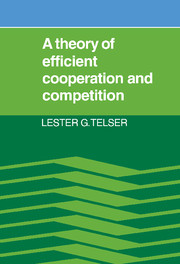Book contents
- Frontmatter
- Contents
- List of tables
- Preface
- Chapter 1 Prologue
- Chapter 2 Perceptions and reality: the genesis of the Sherman act
- Chapter 3 Competition, cooperation, and efficiency
- Chapter 4 Stable coalitions
- Chapter 5 Equilibrium with decreasing average cost: an application of the theory of the core illustrated by production and exchange among spatially separated markets
- Chapter 6 A theory of self-enforcing agreements
- Chapter 7 Some new results on duopoly applied to theories of Cournot, Bertrand, and Edgeworth
- Chapter 8 Rivalry by means of innovation
- References
- Index
Chapter 1 - Prologue
Published online by Cambridge University Press: 03 November 2009
- Frontmatter
- Contents
- List of tables
- Preface
- Chapter 1 Prologue
- Chapter 2 Perceptions and reality: the genesis of the Sherman act
- Chapter 3 Competition, cooperation, and efficiency
- Chapter 4 Stable coalitions
- Chapter 5 Equilibrium with decreasing average cost: an application of the theory of the core illustrated by production and exchange among spatially separated markets
- Chapter 6 A theory of self-enforcing agreements
- Chapter 7 Some new results on duopoly applied to theories of Cournot, Bertrand, and Edgeworth
- Chapter 8 Rivalry by means of innovation
- References
- Index
Summary
Introduction
This book has three main divisions. The first introduces the major themes, the second studies the conditions under which an efficient equilibrium exists, and the third examines the consequences of rivalry.
The basic tenet is that an efficient equilibrium requires an appropriate combination of both cooperation and rivalry. Under the cost conditions typical of many industries in a modern free-enterprise economy, it is not possible to have efficient results unless there are areas of cooperation among firms and among customers as well as rivalry. This was not fully understood in the last half of the nineteenth century in the United States and is still hotly debated. The purpose of Chapter 2 is to place the debate in its historical setting by discussing the events preceding and following the passage of two major legislative acts, the Interstate Commerce Commission Act of 1887 and the Sherman Antitrust Act of 1890. The proposition that an equilibrium may not exist unless firms are allowed to cooperate in some areas would probably not have been accepted by the supporters of antitrust legislation and railroad regulation even if they had been aware of it. Many proponents of this legislation considered competition as good under all circumstances and did not recognize the complications arising from the new technology: capital intensive methods of manufacturing, mass production and the use of interchangeable parts, improvements in communication and transportation, and so on.
- Type
- Chapter
- Information
- Publisher: Cambridge University PressPrint publication year: 1987



